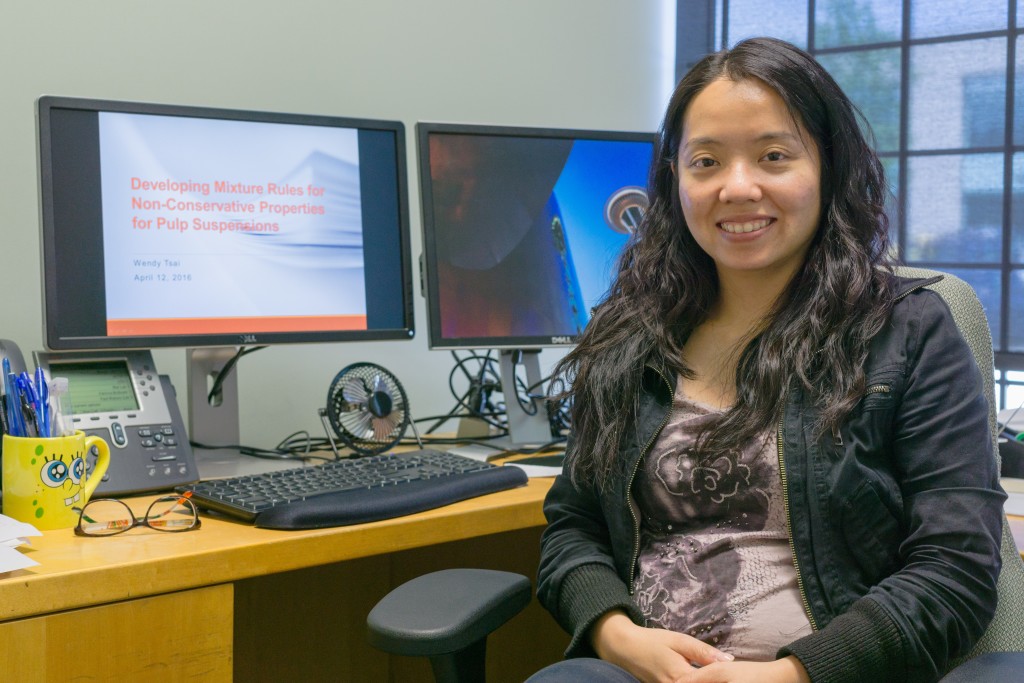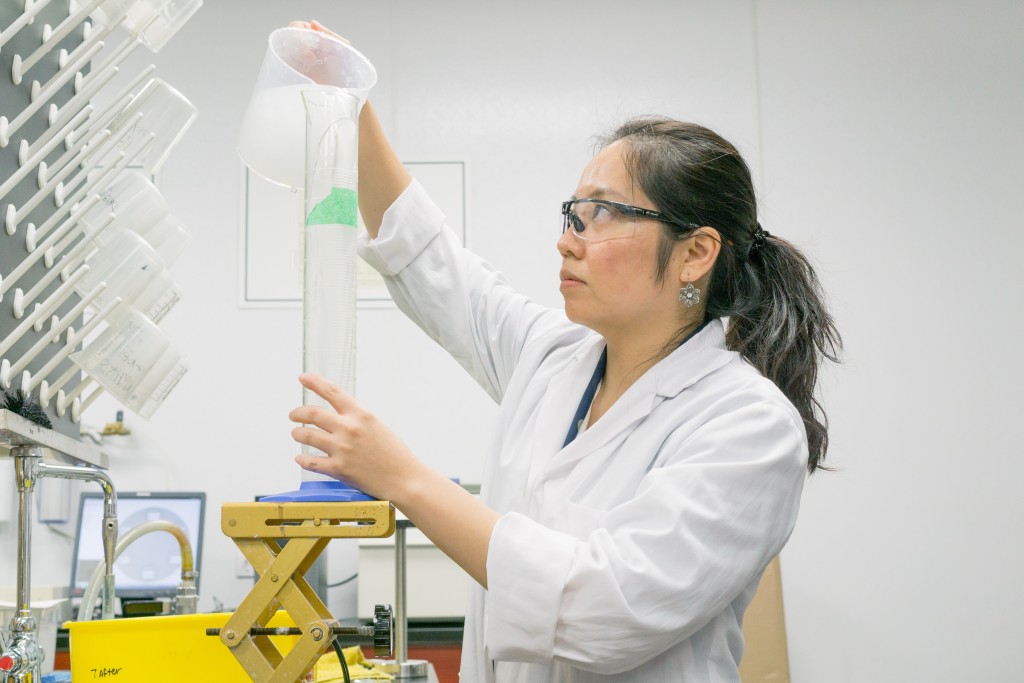CPI Profiles: Wendy Tsai
19 juin 2016 9:17 Laisser vos pensées
Before starting this week’s blog, I would like to start off giving a shout out to all the other Green Dream interns. I encourage you all to check out the blogs from the other interns if you haven’t already done so. Stefano for example is not only writing but also hand illustrating comic strips in his blog. I am excited to see what other content you all come up with in the next couple months. And now back to our regular scheduled content.
It is strange that although I have been working at Canfor Pulp Innovations for over 5 months, I feel like don’t know much about my supervisors outside of work. This is why I decided to go around and interview my supervisors to learn about their journey in the pulp and paper industry and how they ended up working at Canfor Pulp Innovation.
This week I interviewed our engineer and UBC Alumni, Wendy Tsai. Standing at a towering 5’2”, I find it funny that most of our interactions this term have been asking me to bring stuff down that are slightly out of her reach. What she may lack in height, she makes up for it in brains (she recently completed her Masters in Applied Science from UBC) and energy around the office. Wendy got her start with the company as a co-op student and has been working full-time with the company for 12 years. Since she graduated from the same program that I am currently in, I wanted to learn about her experience as an undergraduate student.
Tony: What is your role at CPI how has it changed since you first worked as a co-op student?
Wendy: I started making and testing hand sheets like you did during your first work term. Luckily a position opened up for a full-time position after I graduated. Once I first got hired as a full time, I started dealing with more of the chemical analyses. Over the years, my role within the company has changed but I am currently working a lot on Canfor’s tissue products. I am helping Canfor explore ways to create better tissue products for its customers.
TW: Can you tell me about your experience as an undergraduate student? What were some of the things that you took away from your undergrad?
WT: My undergrad experience was probably very similar to yours. It was a lot of work and hellish at times. I never found the concepts taught in class to be too difficult to grasp without a little effort. I think that it helped that most of work was expected to done in a group setting so you have the opportunity to discuss problems and bounce ideas off each other. I learned a lot about working in a team.
TW: What was your favorite subject? Did you have a least favorite?
WT: Hmm, my favorite one was the one that combined energy balance and reactors.
TW: Was it reactor design?
WT: Yes I think it was.
TW: What was your least favourite?
WT: Matlab, as programming is not my strong suit.
TW: One of the goals for my blog is to introduce other chemical engineering student about the pulp and paper/Canadian forest products industry. I feel like it isn’t advertised well in school and is not as hyped up to students as the oil and gas or mining industry. Can you tell me about how you ended up working for Canfor?
WT: I agree with you, during my undergraduate degree I don’t think we had a course on pulp and paper. My first introduction in the pulp and paper industry was through the co-op program. My first job was based at a paper mill, working for a chemical company that supplies chemicals to the mill. During that time, I had gained valuable working knowledge about the chemistry used in the paper production process.
My second co-op job was at a paper mill as a process engineer. There I got to experience working in the operations side of things in the mill.
Finally my last co-op job was at CPI where I assisted in the pulp quality control program by preparing and testing hand sheets. I was offered a full time job after I graduated. Since I enjoyed the work that I did before and the people that I worked with during my time there, I decided to accept the position in order to learn more about the pulp and paper industry. I liked that the position allowed me to do a variety of different tasks and have the opportunity to further enhance my learning by providing financial support for my Master study at UBC.
TW: Was the pulp and paper industry always somewhere that you envisioned yourself working in? One of my insecurities is that I don’t know what exactly I want to do with my degree after graduation.
WT: I was in your shoes back then as well. It wasn’t something that I committed myself to at the beginning. The co-op program played an instrumental part in my education. Through co-op I was able to see different sides of the pulp and paper industry. The thought of pursuing a career in the industry crossed my mind after I had worked a couple of work terms in the industry.
TW: You recently earned you Masters of Applied Science this May for your thesis, “Developing Mixture Rules for Non-Conservative Properties for Suspensions”. Can you briefly explain your research?
WT: The objectives of my research are to establish an effective and sound methodology to predict the properties of a two component mixture and develop methods to determine optimum operating conditions needed to achieve set target properties for the mixture. The significance of this research can help papermakers to develop prediction models for any kind of mixtures without conducting a full sequence of lab work.
TW: Coming full circle, you started off with the company as a co-op student and now you are in charge of hiring and training new co-op students. What are some important qualities that you look in an individual in the workplace? Do you have any advice for other co-op students out there?
WT: Firstly, my advice to the co-op students out there is to be prepared to work hard. Secondly, the ability to take initiative is an attribute that I think is important to have. Taking the initiative to actively ask questions on the job will allow you to learn more and enhance your work experience. Just try talking to one of the operators working at the mills, and he might share with you some words of wisdom that will stick with you for the rest of your life.
TW: Thank you Wendy for taking the time to do this interview and sharing your story with the readers.


